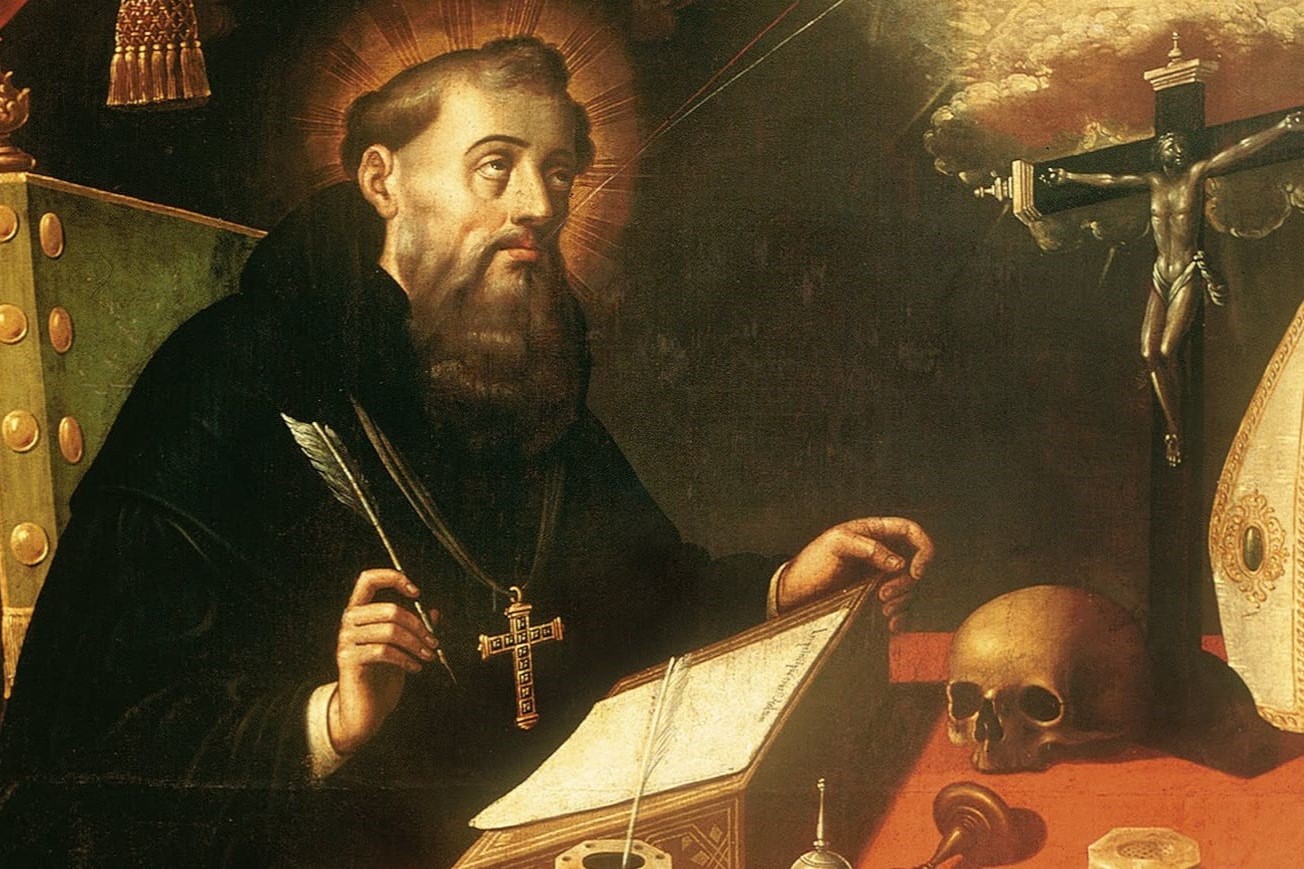Home>Theology and Spirituality>What Is The Charismatic Christian Movement


Theology and Spirituality
What Is The Charismatic Christian Movement
Published: February 11, 2024
Jason DeRose, Managing Editor at Christian.net, uses his expertise in religion and journalism to deepen understanding of faith's societal impacts. His editorial leadership, coupled with a strong academic background, enriches the platform’s diverse content, earning him recognition in both journalism and religious circles.
Discover the theology and spirituality behind the Charismatic Christian movement. Explore its beliefs, practices, and impact on modern Christianity.
(Many of the links in this article redirect to a specific reviewed product. Your purchase of these products through affiliate links helps to generate commission for Christian.net, at no extra cost. Learn more)
Table of Contents
Introduction
The Charismatic Christian movement is a vibrant and diverse expression of Christianity that emphasizes the active presence of the Holy Spirit in the lives of believers. It is characterized by a fervent pursuit of spiritual gifts, such as speaking in tongues, prophecy, and healing, as described in the New Testament. This movement has had a profound impact on the global Christian landscape, shaping worship practices, theological perspectives, and the lived experiences of millions of adherents.
At its core, the Charismatic Christian movement is rooted in a deep longing for a personal and transformative encounter with the divine. Followers of this movement seek to cultivate a dynamic and experiential relationship with God, often marked by moments of intense emotional and spiritual intensity. This emphasis on the immediacy of God's presence sets the Charismatic movement apart from more traditional expressions of Christianity and has led to the proliferation of diverse worship styles and spiritual practices.
The movement's origins can be traced back to the early 20th century, with the emergence of Pentecostalism as a distinct theological and experiential phenomenon. The Azusa Street Revival in Los Angeles, which began in 1906, is often cited as a pivotal event that catalyzed the spread of Pentecostal beliefs and practices, including speaking in tongues and divine healing. Over time, the Charismatic movement expanded beyond Pentecostal denominations, influencing a wide spectrum of Christian traditions, including Catholicism, Protestantism, and independent charismatic fellowships.
As the movement gained momentum, it became a catalyst for spiritual renewal and revival within established Christian communities, breathing new life into traditional liturgical practices and theological frameworks. The Charismatic movement's emphasis on the supernatural work of the Holy Spirit has reinvigorated worship services, inspiring passionate expressions of praise and worship, and fostering a sense of spiritual expectancy among believers.
In the following sections, we will delve into the rich history, core beliefs, and transformative impact of the Charismatic Christian movement, exploring its influence on contemporary Christianity and its enduring significance in the lives of believers around the world.
Read more: What Is The Hyper Charismatic Movement
History of the Charismatic Christian Movement
The history of the Charismatic Christian movement is a tapestry woven with threads of spiritual fervor, theological innovation, and transformative encounters with the divine. Its roots can be traced back to the early 20th century, with the emergence of Pentecostalism as a distinct expression of Christian faith. The Azusa Street Revival, which commenced in Los Angeles in 1906, stands as a watershed moment that catalyzed the spread of Pentecostal beliefs and practices, igniting a spiritual fire that would eventually shape the trajectory of global Christianity.
At the heart of the Charismatic movement is a profound emphasis on the active presence and work of the Holy Spirit in the lives of believers. The early pioneers of the movement, inspired by the experiences of the apostles as recorded in the New Testament, sought to reclaim the supernatural manifestations of the Spirit, such as speaking in tongues, prophecy, and miraculous healings, as integral components of the Christian faith. This fervent pursuit of spiritual gifts and the belief in the ongoing relevance of the miraculous gifts of the Spirit set the stage for the Charismatic movement to unfold.
As the movement gained momentum, it transcended the boundaries of Pentecostal denominations, permeating a wide spectrum of Christian traditions, including Catholicism, Protestantism, and independent charismatic fellowships. The Charismatic renewal within established Christian communities breathed new life into traditional liturgical practices, infusing worship services with a sense of spiritual vibrancy and expectancy. This revitalization of worship, characterized by passionate expressions of praise and worship, became a hallmark of the Charismatic movement's influence.
The Charismatic movement's impact extended far beyond the realm of worship and spiritual experiences. It sparked theological reflection and dialogue, prompting scholars and theologians to grapple with the implications of a renewed emphasis on the Holy Spirit's dynamic work in the contemporary church. This theological ferment gave rise to a rich tapestry of Charismatic theology, exploring themes such as the nature of spiritual gifts, the role of the Spirit in the life of the believer, and the relationship between spiritual experiences and doctrinal orthodoxy.
In the ensuing decades, the Charismatic movement continued to evolve and diversify, giving rise to a myriad of expressions and emphases within the broader charismatic landscape. Today, the movement's influence can be felt across continents, shaping the worship practices, theological perspectives, and spiritual experiences of millions of believers. The history of the Charismatic Christian movement stands as a testament to the enduring impact of spiritual renewal and the dynamic work of the Holy Spirit within the tapestry of Christian faith.
Beliefs and Practices
The Charismatic Christian movement is characterized by a distinctive set of beliefs and practices that reflect its emphasis on the active presence and work of the Holy Spirit in the lives of believers. At the core of Charismatic theology is a fervent conviction in the ongoing relevance of spiritual gifts, as described in the New Testament, and a deep longing for a transformative encounter with the divine. These beliefs find expression in a myriad of practices that shape the worship, spirituality, and communal life of Charismatic communities.
Emphasis on Spiritual Gifts
Central to Charismatic beliefs is the conviction that the Holy Spirit bestows spiritual gifts upon believers for the edification of the church and the advancement of God's kingdom. These gifts, as outlined in the New Testament, include speaking in tongues, prophecy, healing, discernment of spirits, and various forms of supernatural manifestations. Charismatic Christians place a strong emphasis on cultivating an environment where these gifts can operate freely, often incorporating times of corporate prayer, worship, and the laying on of hands to facilitate the expression of spiritual gifts.
Experiential Worship
Charismatic worship is marked by a deep sense of spiritual expectancy and a fervent pursuit of intimacy with God. Worship services are often characterized by vibrant expressions of praise, heartfelt prayers, and spontaneous moments of spiritual manifestation. The use of contemporary music, including lively praise songs and anthems, serves as a vehicle for ushering congregants into a heightened awareness of God's presence. The spontaneity and freedom in worship allow for moments of prophetic utterances, tongues and interpretation, and the ministry of healing, creating an atmosphere where the supernatural work of the Spirit is eagerly anticipated.
Read more: What Is Charismatic Christian
Prayer and Intercession
Prayer holds a central place in the spiritual life of Charismatic believers, who view it as a powerful means of communing with God and effecting change in the spiritual realm. The practice of intercessory prayer, where individuals or groups petition God on behalf of others, is highly valued within Charismatic communities. This emphasis on prayer as a catalyst for spiritual breakthroughs and divine intervention underscores the Charismatic belief in the transformative power of prayer and the Holy Spirit's responsiveness to the cries of His people.
Holistic Spirituality
Charismatic Christianity espouses a holistic approach to spirituality that encompasses the physical, emotional, and spiritual dimensions of human existence. The belief in divine healing, both physical and emotional, is a prominent feature of Charismatic theology, leading to the practice of laying hands on the sick and praying for their restoration. This holistic view of spirituality also extends to the belief in inner healing and deliverance from spiritual bondage, as Charismatic Christians seek to address the multifaceted needs of individuals through the power of the Holy Spirit.
Discipleship and Community
Charismatic communities place a strong emphasis on nurturing spiritual growth and fostering a sense of communal belonging among believers. Small group gatherings, discipleship programs, and mentoring relationships are integral to the fabric of Charismatic churches, providing avenues for accountability, spiritual formation, and the cultivation of spiritual gifts. The communal aspect of Charismatic spirituality underscores the belief in the interconnectedness of the body of Christ and the shared responsibility of believers to build one another up in faith.
In essence, the beliefs and practices of the Charismatic Christian movement reflect a deep-seated longing for a vibrant, experiential faith marked by the active presence of the Holy Spirit. These beliefs find expression in the dynamic worship, fervent prayer, and holistic spirituality that define the lived experience of Charismatic believers, shaping their encounters with God and their interactions within the broader Christian community.
Influence and Impact
The Charismatic Christian movement has exerted a profound influence on the global Christian landscape, leaving an indelible mark on worship practices, theological perspectives, and the lived experiences of millions of believers. At the heart of this impact lies a transformative reorientation towards a dynamic and experiential faith, characterized by a fervent pursuit of spiritual gifts and a deep longing for the active presence of the Holy Spirit.
One of the most palpable manifestations of the movement's influence is evident in the realm of worship. Charismatic worship services, marked by vibrant expressions of praise, fervent prayers, and moments of spiritual manifestation, have reinvigorated the worship experiences of countless congregations. The use of contemporary music and the freedom for spontaneous expressions of spiritual gifts have become defining features of Charismatic worship, permeating traditional liturgical practices and inspiring a sense of spiritual expectancy among believers.
Furthermore, the Charismatic movement has catalyzed a renaissance in theological reflection and dialogue, prompting scholars and theologians to grapple with the implications of a renewed emphasis on the Holy Spirit's dynamic work in the contemporary church. This theological ferment has given rise to a rich tapestry of Charismatic theology, exploring themes such as the nature of spiritual gifts, the role of the Spirit in the life of the believer, and the relationship between spiritual experiences and doctrinal orthodoxy. The movement's theological impact has contributed to a broader reevaluation of the supernatural dimensions of Christian faith and the ongoing relevance of spiritual gifts in the life of the church.
Moreover, the Charismatic movement has engendered a spirit of spiritual renewal and revival within established Christian communities, breathing new life into traditional liturgical practices and theological frameworks. The emphasis on the supernatural work of the Holy Spirit has inspired passionate expressions of worship and a sense of spiritual expectancy, fostering a climate of spiritual vitality and anticipation among believers.
The movement's impact extends beyond the confines of individual congregations, influencing the broader Christian community and contributing to a reinvigoration of faith that transcends denominational boundaries. The Charismatic movement's emphasis on the immediacy of God's presence has sparked a renewed hunger for spiritual encounters and a deeper engagement with the supernatural dimensions of Christian faith, shaping the spiritual journeys of believers across diverse cultural and geographical contexts.
In essence, the influence and impact of the Charismatic Christian movement are profound and far-reaching, reshaping the contours of contemporary Christianity and infusing the lived experiences of believers with a sense of spiritual vibrancy and expectancy. The movement's enduring significance lies in its ability to awaken a renewed hunger for the dynamic work of the Holy Spirit and to inspire a deeper engagement with the supernatural dimensions of Christian faith.
Read more: What Is Charismatic Catholic
Criticisms and Controversies
The Charismatic Christian movement, with its emphasis on spiritual gifts, experiential worship, and the active presence of the Holy Spirit, has not been immune to criticisms and controversies within the broader Christian community. While the movement has garnered fervent devotion and transformed the spiritual lives of countless believers, it has also faced scrutiny and pushback from various quarters. These criticisms and controversies have centered on theological, doctrinal, and practical concerns, reflecting the complex interplay between the Charismatic movement and the broader Christian landscape.
One recurring point of contention revolves around the manifestation of spiritual gifts, particularly the practice of speaking in tongues and prophesying. Some critics have raised theological objections to the perceived excesses and abuses of these gifts, expressing concerns about the lack of discernment and order in Charismatic worship settings. The authenticity and interpretation of spiritual manifestations have been subject to intense debate, with skeptics questioning the veracity of certain experiences and the potential for manipulation or emotionalism within Charismatic gatherings.
Furthermore, the emphasis on supernatural healing and deliverance within Charismatic circles has drawn criticism from those who advocate for a more cautious and nuanced approach to the ministry of healing. The intersection of faith, healing, and medical intervention has been a source of contention, with detractors raising ethical and theological concerns about the portrayal of healing as a guaranteed outcome of faith and the potential implications for individuals facing health challenges.
Another area of controversy relates to the perceived commercialization and commodification of spirituality within certain segments of the Charismatic movement. The prosperity gospel, which emphasizes material wealth and financial success as indicators of spiritual favor, has been a subject of intense debate and critique. Critics argue that the prosperity gospel distorts the message of the Gospel, promotes a self-centered approach to faith, and preys on the vulnerabilities of believers seeking divine intervention in their personal and financial lives.
Moreover, the charismatic leadership style and hierarchical structures within some Charismatic churches have come under scrutiny, with concerns raised about issues of accountability, transparency, and the unchecked authority of charismatic leaders. The potential for spiritual manipulation, abuse of power, and the lack of robust governance mechanisms within certain charismatic contexts has prompted calls for greater accountability and ethical oversight within Charismatic communities.
In navigating these criticisms and controversies, the Charismatic movement continues to engage in introspection, dialogue, and self-evaluation, seeking to address legitimate concerns while upholding the core tenets of its faith. The movement's ability to grapple with internal challenges and engage in constructive dialogue with its critics will play a pivotal role in shaping its trajectory and fostering a spirit of humility, discernment, and accountability within the broader Christian community.
Conclusion
In conclusion, the Charismatic Christian movement stands as a testament to the enduring impact of spiritual renewal and the dynamic work of the Holy Spirit within the tapestry of Christian faith. From its humble origins in the early 20th century to its far-reaching influence on contemporary Christianity, the movement has reshaped worship practices, theological perspectives, and the lived experiences of millions of believers around the world.
The history of the Charismatic Christian movement is a narrative of spiritual fervor, theological innovation, and transformative encounters with the divine. Emerging from the roots of Pentecostalism and propelled by the Azusa Street Revival, the movement has transcended denominational boundaries, permeating a wide spectrum of Christian traditions and inspiring a renaissance in worship and theological reflection.
The beliefs and practices of the Charismatic movement reflect a deep-seated longing for a vibrant, experiential faith marked by the active presence of the Holy Spirit. The fervent pursuit of spiritual gifts, experiential worship, and a holistic approach to spirituality has shaped the lived experiences of Charismatic believers, fostering a sense of spiritual vibrancy and expectancy.
The influence and impact of the Charismatic Christian movement are profound and far-reaching, reshaping the contours of contemporary Christianity and infusing the lived experiences of believers with a renewed hunger for the dynamic work of the Holy Spirit. The movement's enduring significance lies in its ability to awaken a deeper engagement with the supernatural dimensions of Christian faith and to inspire a renewed hunger for spiritual encounters.
However, the movement has not been without criticisms and controversies, with debates surrounding the manifestation of spiritual gifts, the ministry of healing, the prosperity gospel, and issues of leadership and accountability. These challenges have prompted the movement to engage in introspection, dialogue, and self-evaluation, seeking to address legitimate concerns while upholding the core tenets of its faith.
In essence, the Charismatic Christian movement continues to be a vibrant and influential force within global Christianity, embodying a fervent pursuit of spiritual vitality, a deep longing for transformative encounters with the divine, and a commitment to fostering a dynamic and experiential faith. As the movement navigates the complexities of the contemporary Christian landscape, its enduring legacy lies in its unwavering devotion to the pursuit of a faith marked by the transformative work of the Holy Spirit.













